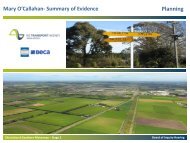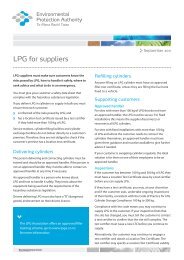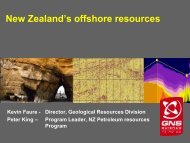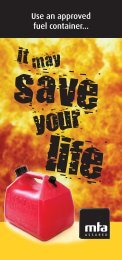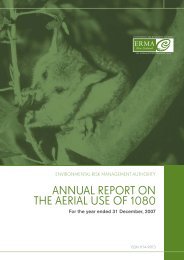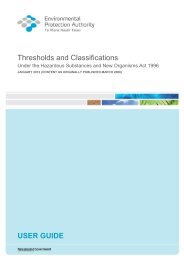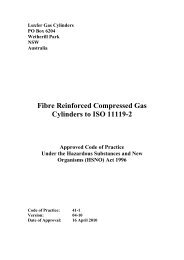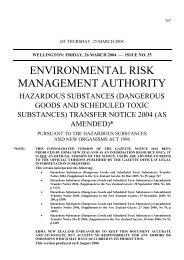Evidence HT Elkington - Environmental Protection Authority
Evidence HT Elkington - Environmental Protection Authority
Evidence HT Elkington - Environmental Protection Authority
You also want an ePaper? Increase the reach of your titles
YUMPU automatically turns print PDFs into web optimized ePapers that Google loves.
Before the <strong>Environmental</strong> <strong>Protection</strong> <strong>Authority</strong><br />
Underthe Resource ManagementAct 1991<br />
ln the itatter ' An application by King Salmon Limited for resource<br />
consents to operate Marine farms.<br />
Between Ngtti Koata Trust Board<br />
Objector<br />
And The NewZealand King Salmon Company Limited<br />
Applicant<br />
Brief of <strong>Evidence</strong> of Hori Turi <strong>Elkington</strong> on behalf of Ngati Koata<br />
FRANK HIPPOLITE<br />
LAWYER<br />
PO Box 1659<br />
NELSON<br />
Telephone: (04) 237 41 10<br />
Facsimile: (03) 548 2569<br />
Email: taimona36@xtta.c,o.nz<br />
Solicitor: Frank HiPPolite
Introduction<br />
1.<br />
2.<br />
3.<br />
4.<br />
5.<br />
6.<br />
7.<br />
8.<br />
My full name is Hori Turi <strong>Elkington</strong>. I whakapapa to all of the waka of<br />
the great migration. I am a recognised maritime specialist within the<br />
rohe moana of both NgatiToa and Ngati Koata.<br />
My middle name Turi is integral with our whakapapa. lt is the name of<br />
my father, a recognised master Mariner of Ngati Toa and Ngati Koata<br />
descent. lt is the name of my grand Uncle Turi Ruruku. My son,<br />
nephews and grandnephews continue the name. lts origin is from<br />
Turi the navigator of the legendary Aotea canoe of the great<br />
migration. Turi's son Turimataakino, grandson Turimataoneone and<br />
great grandson Turimatarehua continued his name and mana.<br />
Likewise the name. and the mana of "Turi the Navigato/' are<br />
hereditary and continue to flow within the precious veins of our<br />
people.<br />
For generations, perhaps even from the beginning of time my people<br />
have been tohonga moana, o te moana roa, te moana nui. ln other<br />
words "the experts of the ocean, the wide ocean, the large ocean".<br />
Likewise for many generations my people have been the experts for<br />
gathering kaimoana for whanau, for hapu and for iwi tangi and Hui.<br />
I am Kaitiaki o nga Kaimoana for both Ngati Toa and Ngati Koata. As<br />
such, I am authorised to issue customary kaimoana gathering permits<br />
for tangi and hui within the rohe moana of both Ngati Toa and Ngati<br />
Koata.<br />
My whanau own a maritime training school. We also own a fishing<br />
charter business and a small commercialfishing business.<br />
Our vessel Destiny is the first Maori owned commercial vessel to be<br />
launched, following the Crown's recognition under the Treaty of Maori<br />
commercial fishing rights.<br />
Destiny has gone on to establish her own unique mana, as the first<br />
vessel to escort a waka (Te Awatea Hou) across Cook Strait and to<br />
subsequently circumnavigate most of the North lsland and the top of
10.<br />
the South lsland in over a hundred years. Destiny is still the only<br />
vessel to have successfully escorted a waka ama all the way across<br />
Cook Strait (not just a single trip but a return trip on the same day).<br />
She is the only vesselto have successfully escorted a pedal powered<br />
water craft across Cook Strait. She has appeared on television<br />
documentaries three times.<br />
9. I am a Certified Financial Planner and a Chartered Financial<br />
Consultant. I am a Fellow of the lnstitute of Financial Advisers.<br />
This evidence is in relation to the objection by Ngiti Koata to the<br />
grant of resource consents for development of a salmon farm in<br />
Waitata Reach in the Outer Pelorus Sound.<br />
Personal Background<br />
11.<br />
12.<br />
13.<br />
14.<br />
I grew up on Rangitoto ki te Tonga (D'Urville lsland) where I learnt<br />
most of my navigation and seamanship skills. I still presently own<br />
land on Rangitoto kite Tonga.<br />
My mother is Manganui Reeves. Her mother was Leena Watson,<br />
who was raised on Arapawa lsland. My mothe/s grandmother was<br />
Kaiherau of NgaiTahu and Te Atiawa (Puketapu Hapu). My mothe/s<br />
grandfather was Tamati Tahuaroa Watson of Te Atiawa. My father<br />
was Turi Ruruku <strong>Elkington</strong>. His mother was Wetekia Ruruku of Ngati<br />
Koata and Ngati Awa. My father's father was Ratapu <strong>Elkington</strong> of<br />
Ngati Toa and Ngati Tama. Ratapu's mother was Marara,<br />
granddaughter of Nohorua, older brother of Te Rauparaha and one of<br />
Ngati Toa's prominent chiefs.<br />
My family has always had strong ties to the ocean, as did their<br />
tupuna. The ocean still forms a vital part of our lives today but it was<br />
even more integral to the lives of our tupuna. lt provided sustenance,<br />
recreation, employment, spiritual well-being and a vital means of<br />
travel.<br />
It was via the ocean that the waka of the great migration touched the<br />
shores of Aotearoa. The ocean and waka are bound up in the history
15.<br />
16.<br />
17.<br />
18.<br />
19.<br />
Ngati Koata<br />
of Maori migration and movement. They played a vital part in the<br />
conquest of Te Tau lhu by Ngati Toa, Ngati Koata and their allies.<br />
My father Turi Ruruku <strong>Elkington</strong> was born at sea and made his living<br />
from the sea. His seafaring accomplishments are legendary.<br />
Our family comes from a fishing background. My father and his<br />
brothers and cousins were commercial fishermen. My father and<br />
uncles saw that these skills were passed down. All of my brothers<br />
and I are certified mariners. My older brother was the first Maori to<br />
have both deep-sea navigation and deep-sea chief engineer's tickets.<br />
My younger brother is a deep-sea skipper familiar with fishing in<br />
international waters. He can catch more fish in one trip than my<br />
father and uncles caught in their lifetimes combined. But they taught<br />
him the basics.<br />
ln the olden days people were more sea-oriented because there was<br />
no other option. Knowledge of the tide and weather patterns was the<br />
essence of living close to the sea. Such knowledge was passed<br />
down to succeeding generations.<br />
We were taught to navigate without navigational aids. We could<br />
navigate by the sky and by the skyline at night. !f we got caught in<br />
the fog, we would determine the motion of the vessel and the<br />
direction of the wind and rain in relationship to our boat and we could<br />
keep our boat on course.<br />
For all of these reasons the sea and the marine environment are of<br />
the utmost significance to us.<br />
20. I am a board member for the Ngati Koata Trust Board.<br />
21.<br />
Following the battle on Kapiti lsland known as the battle of Waiorua in<br />
1825, Ngati Koata accepted the tuku (customary gift) from<br />
Tutepourangi, who was a paramount chief of Ngati Kuia and<br />
associated iwi (who originally inhabited this part of the Sounds) and
22.<br />
23.<br />
24.<br />
25.<br />
26.<br />
settled in Te Tau lhu. This tuku resulted in an arrangement of peace<br />
between Ngati Koata and Ngati Kuia and associated iwi.<br />
According to Ngati Koata history the tuku commenced at the western<br />
entrance to the Pelorus Sound including Kurupongi (The Trios<br />
lslands), Nga Kiore (The Jags), Takapourewa (Stephens lsland) and<br />
on to FarewellSpit.<br />
The tuku was cemented by high-ranking marriages between the<br />
senior rangatira of Ngati Koata and the female relatives of<br />
Tutepourangi and other senior Ngati Kuia leaders. By this means -<br />
the joining of whakapapa -<br />
the tuku was confirmed, the rights of Ngati<br />
Koata were validated and the continuation of Ngati Kuia rights also<br />
ensured.<br />
ln accepting the tuku, Ngati Koata chiefs also accepted a kaitiaki role<br />
to protect our Ngati Kuia cousins from our marauding North lsland<br />
cousins. One of our fighting chiefs, a large man often called 'The<br />
giant \Mrakatari', stationed himself outside the entrance to the<br />
Pelorus Sound not far from both this subject salmon farm application<br />
and the existing farm in Waihinau Bay. His mana and protection and<br />
the mana.and protection of subsequent Ngati Koata chiefs extend<br />
beyond the boundaries of the tuku. \tVhakatari's bravery and<br />
protectionism are legendry.<br />
It is under the same spirit of mana and protectionism established by<br />
our Tupuna that this evidence is submitted. As such, the salmon<br />
farms in the Waitata reach and the Pelorous are of significance to us.<br />
Not just because we have our people living in the vicinity, as we did in<br />
ancient times, but because our protectionism extends to all people,<br />
regardless of race or culture.<br />
Ngati Koata Trust has an lwi Management Plan (10 June 2002)<br />
('Ngati Koata IMP') which has been lodged with Council. The'lMP' is<br />
legal evidence that the protection of the environment is significant to<br />
our lwi.
Position of Ngati Koata<br />
27.<br />
28.<br />
29.<br />
30.<br />
31.<br />
32.<br />
Ngati Koata is opposed to the establishment of such a large number<br />
of salmon farms due to the cumulative effect they will have on the<br />
moana, the mauri of the moana and all of the other taonga within the<br />
area.<br />
There are taonga that we as kaitiaki must protect. The \tVhanau hapu<br />
and iwi are first and foremonst in the list of taonga. All of the lka and<br />
manu in the rohe are also taonga. Besides iwi the next most<br />
important taonga are Moana and the \Nhenua.<br />
Ngdti Koata are a seagoing iwi. My family have been associated with<br />
navigation for generations. lt is of upmost importance to be able to<br />
navigate the sea. ln our ancestors days we would travel extensivley<br />
and frequently by waka. Attached to my evidence and marked "1" is a<br />
chart of our waka routes. The propsed farms at Tapipi and Richmond<br />
will interfere with the waka routes and by so doing would impinge on<br />
our mana, our kaitiakitanga and out rangatiratanga.<br />
As A Seaman and mariner interfering with and changing the<br />
navigation routes have major effects on our travel. Even though we<br />
may rely on modern instruments for navigation the old waka routes<br />
are a taonga to us as an iwi.<br />
The area around Write Horse Rock is rich in marine and bird life.<br />
Ngati Koata is very concerned about the contamination of the marine<br />
environment by the salmon farm. ln particular, we are concerned<br />
about the use of artificial feed, the use of chemicals such as copper<br />
as antifoulants, and the deposition of fish faeces, which then impact<br />
on the sea floor and the surrounding marine life.<br />
Ngati Koata is concerned about the artificial feed to be used which is<br />
described as being "sourced from overseas" and which is made up of<br />
"fishmeal, fish oil and some vegetable or poultry protein" as well as<br />
"added vitamins and minerals" (part 6.6 of the application)'
33. We are also very concerned about the deposition of faeces from the<br />
u.<br />
35.<br />
salmon and uneaten feed, which leads to over-enrichment of the<br />
seabed, with extremely adverse effects on the seabed and<br />
surrounding sea life. This is even more significant in combination<br />
with the existing effects which are already occurring to the marine<br />
environment from the farm at Waihinau Bay.<br />
The Blue Cod Management Group report that there has been a huge<br />
decline in fish stocks in the Sounds. Ngati Koata believes that<br />
improving and maintaining the health of our marine environment is<br />
crucial for this part of the Marlborough Sounds.<br />
For all of these reasons, we believe that all of the salmon farms<br />
applied for will have significant adverse effects on the marine<br />
environment and on the natural character of this important part of the<br />
Sounds. We consider that these effects are even more significant in<br />
combination with existing effects from the current salmon farm at<br />
Waihinau Bay.


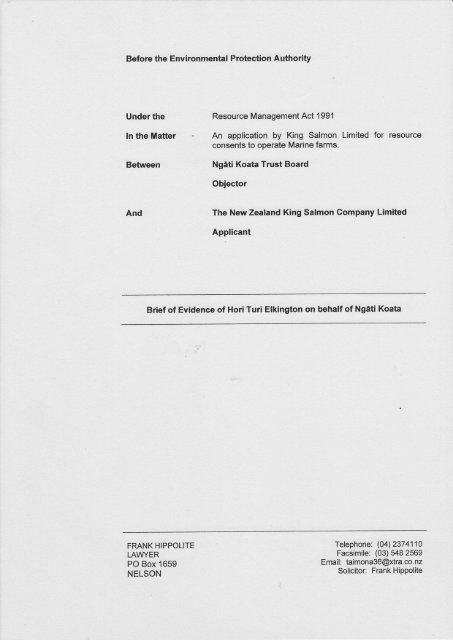
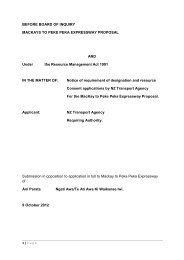
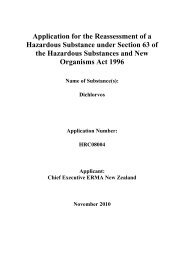
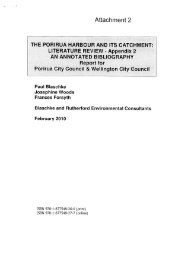
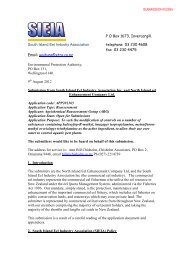

![Application for test certificate [pdf, 131kb]](https://img.yumpu.com/50666502/1/184x260/application-for-test-certificate-pdf-131kb.jpg?quality=85)
